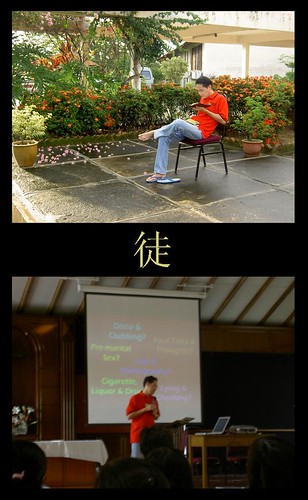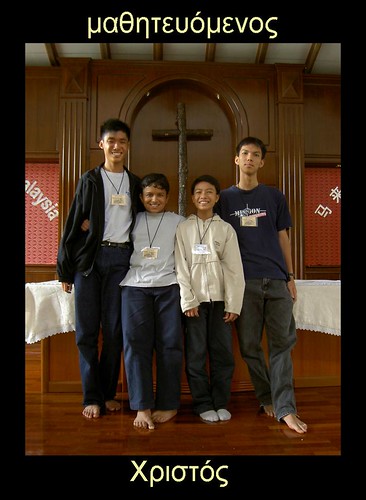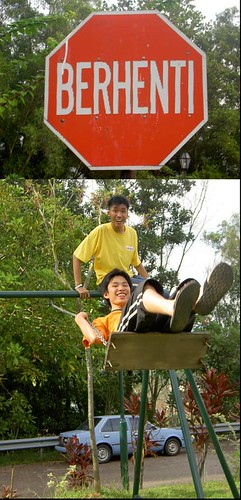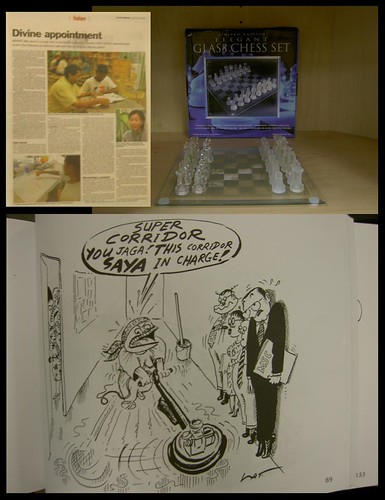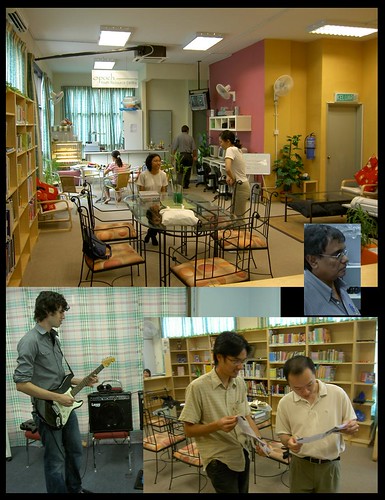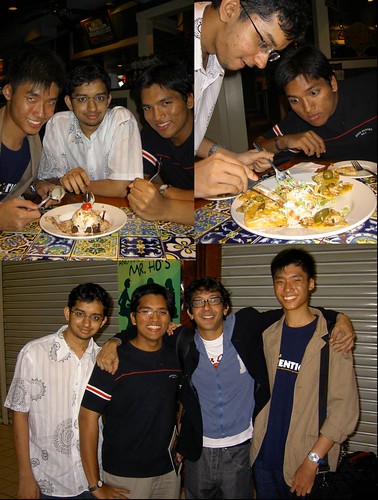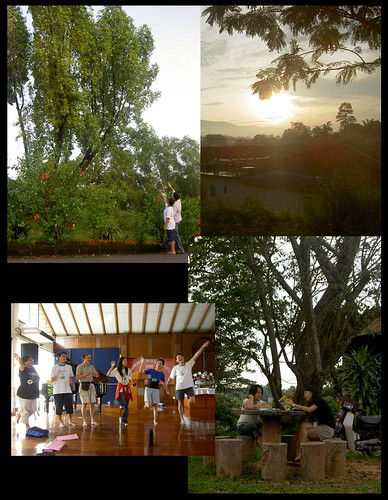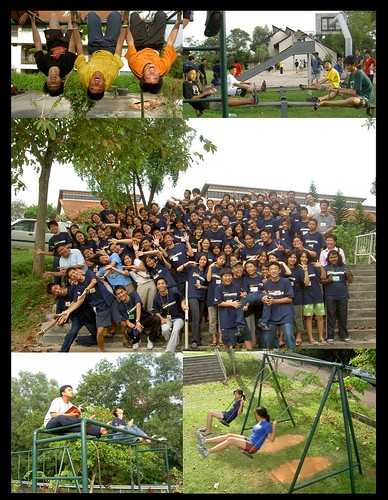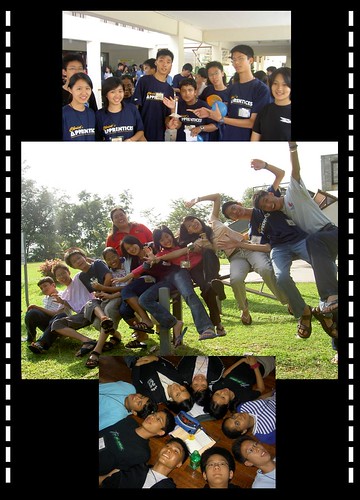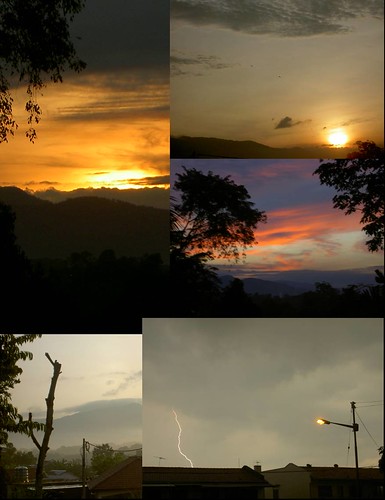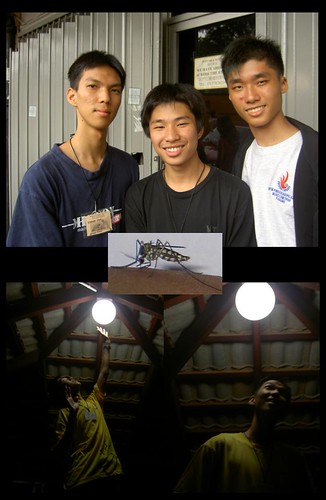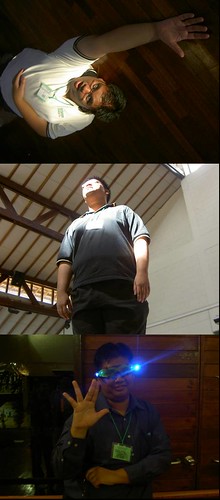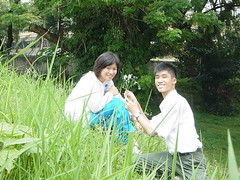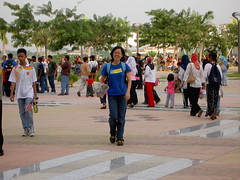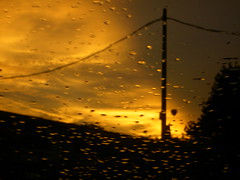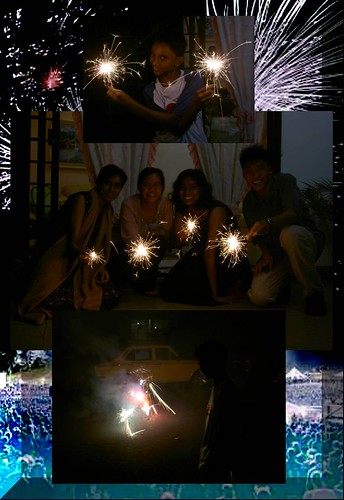At this point, some are beginning to wonder; "Ben's NSCF reflections are getting longer and longer. When will they ever end?" So, I officially declare, this is the final entry!
On Saturday morning, Uncle Jason gave the most inspiring closing challenge I have ever heard for any event/camp. He talked about the Chinese characted 'tu' (above), which means 'disciple.' It is a compound word, comprising 'two persons' and 'walking,' and implies that discipleship is 'a Master and an apprentice walking together.'
He described our lives as Christ's apprentices, as a series of arrivals, journeys, celebrations and departures, and illustrated our journey thus;
Walk with God...
Walk away from God?
Walk back to God!
Walk again with God...
At one point in the middle of his challenge, he gave some examples of the problems that plague today's youth--the very context into which we apprentices of Christ will be plunged upon our return to the 'real world':
Disco and clubbing
Foul talk and thoughts
Lying and cheating
Cigarettes, liquor and drugs
Lust and pornography
Pre-marital sex
If I remember correctly, he said that these would usually become more of an issue as a person grows older. Having seen eighteen years of life, I cannot disagree with him, and am myself guilty of many of them.
And this is where we must consider question with which he began; is it easier to die for Christ, or to live for Christ?
Indeed, it is harder the live for Christ, for it requires a daily dying to self, an hourly denial of desires, thoughts and actions that oppose the Spirit of Christ.
There's a J. Oswald Sanders quote in the Teachers' Christian Fellowship (TCF) of Malaysia's newsletter, In Step, Volume 15 Issue 4, which reads as follows;
"In most decisions the difficult part is not in knowing what we ought to do; it is in being willing to pay the price involved."
But Uncle Jason pointed out, very wisely, that there is no real sacrifice. To give something up in order to receive something greater is no sacrifice. The price we pay is nothing compared to the reward which awaits us.
I didn't understand this until I read similar thoughts in Willard's 'The Divine Conspiracy' some days later;
"There is no such thing as a dreadful price for the 'pearl' in question [Matt 13:45-46]... The point is simply that unless we clearly see the superiority of what we receive as his students over every other thing that might be valued, we cannot succeed in our discipleship to him."
Paul famously wrote to the Philippians (and do bear in mind that he wrote this while under Roman house imprisonment);
"...I consider everything a loss compared to the surpassing greatness of knowing Christ Jesus my Lord, for whose sake I have lost all things. I consider them rubbish, that I may gain Christ and be found in him..."
Wow! I consider my Cambridge Ph.D rubbish; my Olympic gold medals are worthless; the datuk-ship is nothing; all authority I wield amounts to nought.
Uncle Jason put it bluntly when he said, "The King James Version uses the word 'dung,' but Uncle Jason says, 'I consider them shit."
For what? Why do we consider them shit? Because we have found something worth so much more, against which all that we now possess can register no weight. The excerpt from Philippians closes with what is unmistakably the prayer of an apprentice;
"I want to know Christ and the power of his resurrection and the fellowship of sharing in his sufferings, becoming like him in his death, and so, somehow, to attain to the resurrection from the dead."
And this is where the encouragement comes in.
In John 21, Jesus asks Peter three times, "Do you love me?" Willard points out that Jesus uses the word 'agapas' the first two times, then switches to 'philo' on the third. Peter answers all three with 'philo.'
So, far from being an exercise in redundancy, Jesus is showing Peter just how small Peter's love is, which cannot rise above 'philo' to the perfect 'agape' love.
But that did not deter Jesus, and he turned this flimsy apprentice into the rock upon which the church was built. Even from the beginning of his ministry, Jesus gave him the name 'Peter' which means 'rock.'
We may not be good enough to answer God's call, but that's no excuse. As Sanders writes in 'Spiritual Leadership';
"When God calls us, we cannot refuse from a sense of inadequacy. Nobody is worthy of such trust. When Moses tried that excuse, God became angry (Exodus 4:14). Let us not pass the buck of leadership because we think ourselves incapable."
We must follow, not because we are capable, but because God is. Indeed, as Sanders adds elsewhere in the book, quoting the Salvation Army preacher Samuel Brengle;
"The axe cannot boast of the trees it has cut down. It could do nothing but for the woodsman. He made it, he sharpened it, and he used it. The moment he throws it aside, it becomes only old iron. O that I may never lose sight of this."
In camp, Nigel said again and again to remind us, echoing the words of John the Baptist, "He must increase and I must decrease." In retrospect, he admits that it was really God who ran the camp.
Prior to camp, I actually told Nigel I wanted to put on a different image. Eventually, I remained myself at camp, because that was what I was meant to be. And the image I wanted to try was some radical, John-the-Baptist-type character.
But now I find that I could not be John the Baptist, simply because I wasn't ready. And that is the challenge that now lies before me; to yield to Christ, and let him increase in my life, displacing the power I have over myself.
In an amazing irony, as C.S. Lewis wrote, it is once we fully surrender to God, that we truly become ourselves and realise our full potential.
Some four years ago, I took a course in evangelism. Every week, we would gather as a class to discuss and evaluate our respective team's work during the week. The purposes of these meetings were for Instruction, Inspiration and Intercession.
At the end of the course, I would've gotten a perfect score in the exam, had I not forgotten the word 'intercession.' Never again would it slip my memory.
I never mentioned one of the most moving experiences I had at camp. After Uncle Earn Soo's last talk on Thursday night, I went forward for the altar call, and spent some time there kneeling.
Only when I got up did I realise that it was Simon who spent a long time kneeling beside me, and who prayed for me, after Runa and an unidentified intercessor did so much earlier on.
Intercession is what the Christian community in many ways exists for. It is the hallmark of what I believe d'NA stands for: being there for one another, representing each other before the throne of heaven.
At the end of the day, it was just a six-day camp. So what? Why bother writing so many reflections? Isn't this all just a sudden spiritual high?
If I may say so, with no hint of dishonesty or exaggeration, I don't think so. I do not believe the work God started in camp will amount to nothing. After all, the entire Christian movement has been based on a wooden crossbeam and three nails... not to mention a giant rock which ones sealed a cave.
There is no power in objects or humans alone, but it is God who gives meaning and significance and purpose.
When camp began, Nigel posed this question to us all, "Why are you here?"
I wrote something then. And at the reflection on Friday, I wrote something again, as we were supposed to evaluate our purpose as we saw it differently after the few days.
Now, if asked that question, I can only say, it was the will of God. By his grace I was led to the camp, for purposes which I am only beginning to discover. In short, I do not yet know.
But God does, and I pray I may find out by following him ever so closely, walking with him and watching him do what he does. Being his apprentice in the unforced rhythms of his boundless grace.
Amen.
Wednesday, November 30, 2005
NSCF 9: The Challenge of Apprenticeship
Reflections on today
When I consider the KL/PJ School Christian Fellowship Convention committee meeting this morning, I realise that the kingdom of heaven isn't very popular amongst most people today. Somehow a lot of comments made were not in the spirit of constructivism, let alone the Spirit of God. And on the whole, it seems that God was present only in the opening and closing prayers. Methods and personal ideas seemed to dominate much of the discussions.
In a way, it disappoints me, for the ones present at the meeting are leaders of their respective school Christian Fellowships. If the leaders cannot see clearly, what of their followers? But I rejoice that hope is not lost, for if God could change me, of all the sinners in this world, he can surely do more with these enterprising young lives.
I don't know if Simon will ever read this (he finds my blog too tedious, heh), but the theme he suggested, 'The Berean Call,' probably reaches deeper than he realises. It is based on Acts 17:11, which goes;
"Now the Bereans were of more noble character than the Thessalonians, for they received the message with great eagerness and examined the Scriptures every day to see if what Paul said was true."
This is missing from the Christian community at large. Many are eager and enthusiastic when it comes to organising programmes, events and the like. But how many are interested in Jesus anymore? Bible studies don't attract large crowds. We are becoming shallow people.
I believe the convention should be a follow-up of the NSCF camp, at least in spirit and tone if not in substance. And to do that, we must return to Scripture, the written word, and thence unto the Living Word. It is instructive to note that Simon based his theme on words of Scripture, while many others today would seek out Scripture merely to go with their themes, because "must have Bible verse mah..."
Later in the afternoon, I was having lunch in the same mamak restaurant in Section 14 where Alissa, Tee Ming and I had dinner exactly a week ago. After finishing my indo mee goreng, I turned to J. Oswald Sanders' 'Spiritual Leadership' (compulsory reading for d'NA this year; Annette's class!) when I looked up and beheld a familiar face: Darren!
Darren Cheong was the VI Christian Union's vice-president last year, and the best any president could ever dream of having. He has recently finished his Monash University Foundation Year (MUFY) at Sunway College, and intends to do some lay courses at the Bible College of Malaysia (BCM) next year, before heading to the UK in August if his results are good.
It was a blessing to meet up and chat with him, if only for some twenty minutes. One thing dawned upon us as we talked: a new generation is rising, in and out of the Christian community. This was somewhat evident during NSCF, as Nigel pointed out, and Darren and I could see that the same is happening in our school. The present third formers are in midst of this transition, and the first formers are the new shoots.
The difference between this generation cycle and the one that came before it lies simply in the way they will see and do things; indeed, they will redefine much of what the present cycle leaves behind. Just now, as I pondered this while in the bathroom (a wonderful place for thought), it occurred to me that the present cycle must at all costs avoid the greatest mistake it can make: attempt to produce clones.
And that is why the way in which we approach the coming convention is so important. We must not seek to pass on what we are to the rising generation, but who we are: it is our lives and the heart of God's Spirit that we must share with those who will come after us.
While discussing the sketch for the convention, several remarks were made about the "blur Form 1s and Form 2s." Hello, these people are the future! No one should ever look down on the young ones, ever. Five years ago, I stepped into the VI a spiritually unstable/immature person, not rooted in church. The leaders of the Christian Union did not look down on me, but encouraged me so much that I must say they were giants of patience, for I was frequently irritating and over-talkative.
In that way, the CU became my church, and whatever I have become, I owe it all to these people. And Nigel, I would have never shared 'Magnificent Obsession' and 'God Follower' with you if Mikael Lai, then a fifth former, did not share his passion for Steven Curtis Chapman with this musically ignorant first former.
Tuesday, November 29, 2005
NSCF 8(b): The Legacy of Apprenticeship
What if I were to suggest that the one thing missing from many Christian communities and churches, is the Christ himself?
Well, Dallas Willard has beaten me to it. In 'The Divine Conspiracy,' one of the most striking sub-chapters is entitled "The Case of the Missing Teacher."
This theme runs throughout much of the book, as Willard exposes the areas in Christianity where Christ has been relegated to nothing more than a symbol.
He writes in the Introduction;
"Very few people today find Jesus interesting as a person or of vital relevance to the course of their actual lives. He is not generally regarded as a real-life personality who deals with real-life issues but is thought to be concerned with some feathery realm other than the one we must deal with, and must deal with now. And frankly, he is not taken to be a person of much ability."
Later in the book, under the aforementioned heading "The Case of the Missing Teacher," Willard points out that we are more inclined to refer to the 'latest studies' to learn about everything under the sun, rather than Christ himself.
To further illustrate just how irrelevant Christ has become, he wonders why there are no church courses on how to "love your enemies, bless those that curse you, do good to those that hate you, and pray for those who spit on you and make your life miserable."
Indeed, the entire ministry of Jesus seems to have been condensed into the following statement and its many variations:
"God sent his Son, Jesus Christ, to die for our sins, offering forgiveness so that we can go to heaven after we die."
And we will certainly have to admit that evangelism at present is centred around that. Never mind that reconciliation in the Jewish sense has more to do with a full-life rather than an after-life, and never mind that Jesus was the greatest revolutionary the world has ever known.
How can we be the living body of Christ if Christ himself is not incarnate among us? How can we claim to represent a Christ who isn't even real to us anymore? And how can we expect to pass on the legacy of apprenticeship, if the Master from whom it comes no longer seems to exist?
Matthew 10:7-8 says, "...Freely you have received, freely give." The legacy is that of passing on the torch of apprenticeship unto the Master to others, and especially to the generations that come after us.
In Lewis Wallace's 'Ben Hur,' Balthasar the Egyptian (one of the Magi in his story) says to the other two Wise Men;
"The Spirit brought me first; wherefore I know myself chosen to be the servant of my brethren."
What a contrast this is to the world's 'first come, first served' motto! The duty of seniority is service to the younger ones, to the ones who come after. Jesus himself demonstrated this by washing his disciples' feet.
And this is precisely what the Great Commission of Matthew 28:18-20 is all about; it is not a call to go out and make converts, but one to seek out and train others to be apprentices, even as we apprentice ourselves to Christ. Willard calls this 'discipleship evangelism.'
In the six amazing days of NSCF, this challenge was, to me, the greatest of all. I am a living legacy of the great leaders of the Christian Union who came before me. I have mentioned their names before, but this seems a good occasion to remember once again;
Alvin Kang Nathan
John Phang
Mikael Lai
Loo Huai Zhi
Marcus Lian
Clement Lee
Randy Khoo
Kenneth Liew
Sean Foo
John Ratnaraj
Jonathan Mah
Chan Weng Ken
God forgive me if I have forgotten any.
In a particularly instructive experience at camp, I remember the treasure hunt we had on Thursday. At one point, group John's flame was snuffed out. So, Simon (of Philip) and I (of Peter) went over to U Shen, to relight her candle.
Shortly after that, they found their last clue, and so won the treasure hunt, although it was later discovered that they had actually missed an earlier clue, and so hadn't actually won.
But never mind that. The point it that their group made it to the finish because others 'passed the light.' Incidentally, groups Peter and Philip finished second and third respectively, in what must've been an irony to lose a place to the group we helped.
Yet, we cannot complain, because at some points in the game, our candles also went out, and it was because of other groups that we could continue. At the end of the race called life, we will not be able to say we made it on our own, for we owe our lives to many who have shared their flame with us.
And this is the legacy: to pass on freely the flame which has been bestowed freely upon us.
During our extended reflection on Friday, we were to rewrite Psalm 139 in our own words. I reproduce mine here (with some updating of punctuation and tense):
Searching, finding, yet never quite knowing
The thoughts of the Man-maker,
We are as a looking glass, a clear holder
Through which the light of the ages shines through,
Knowing thoughts and words
Before the glimpse of them rises o'er the horizon.
And none can flee the heavenly hound
In great pursuit of Adam's fallen race;
We are nought and nought in us is found,
But he is nought if not full of grace.
Hide! Try it! This path where you walk
Is already darkened by the Shadow of Shaddai.
The grave cries out, for even it
Cannot bear the death that lingers.
Flailing, fledgling, failing, falling--
Fall into the full earth's core
Where you become nothing more than dust,
Where dying you shall be dead,
And dead be raised to life eternal;
As when a seed is given burial before it grows,
So are we when at this journey's end
We make the turn into the final bend,
And fall into his arms whom God has sent.
And, resurrected time and time again
As was spoken, "Kamikaze, my death is gain."
Raised to thy life, may I ne'er look back,
But remembering my chains run evermore
With passion like never before,
Carrying your name as with a torch;
And walk the road you've marked for me--
The road to where thou call'st the free
To live without anxiety
To live in life eternally:
Path of the Everlasting One
Who knows the path of the setting sun
The Creator of all, the Risen Son.
(Thanks for bearing with the poem's length).
When I shared it with my group, Runa commented that I am a philosopher. But these are not my words; if there is any vestige of that in my writing, it is because of my 'masters'--people like C.S. Lewis and T.S. Eliot.
I am one of their many living legacies, and indeed one of the least. Like U2, who claim to be a 'punk rock band trying to play Bach,' I am a rookie philosopher/poet trying to hold discourse with these giants of faith, intellect, and heart.
There is yet hope for apprentices of Jesus everywhere, as Willard writes:
"For to be a disciple in any area or relationship is not to be perfect. One can be a very raw and incompetent beginner and still be a disciple."
Again, I find U2 a remarkable example of this. Their early albums, such as 'Boy,' 'October' and 'War' exhibit a lot of raw energy. But their most recent albums, 'All That You Can't Leave Behind' and 'How to Dismantle an Atomic Bomb' display the depth of heart that has, after all these years, come to characterise this incredible band.
Their journey has been for some twenty-five years, and it is far from over. Beginning with humble roots (Bono could not play guitar, drummer Larry could not play drums, and bassist Adam could not play bass guitar), they dared to experiment (as with 'Achtung Baby,' 'Zooropa' and 'Pop' in the nineties) and grew so much along the way.
No apprentice--no one, for that matter--is perfect. But the only way to achieve perfection (clearly the goal of the Christian, as expressed in Philippians 1:6 and Matthew 5:48), is to keep learning and growing each day.
We learn from our experience, from our teachers and mentors, and above all, from our Master Jesus Christ. The challenge that comes, as we progress in the kingdom, is to train younger ones whom others would normally underestimate and/or overlook.
Paul writes to Timothy in 1 Tim 4:12;
"Don't let anyone look down on you because you are young, but set an example for the believers in speech, in life, in love, in faith and in purity."
At camp, Simon and I came to experience this firsthand with the youngest members of our groups, Joshua and Aaron respectively. In my opinion, the photo above, with the four of us in it and Christ's symbol in the centre, probably best sums up the camp.
This is apprenticeship: that even as we ourselves are flawed apprentices, we seek to build others up, as we apprentice ourselves together to the Master of all.
And often, if not always, we will find that in training others, we ourselves are built up too.
At the end of the day, there was nothing new I learnt at camp. All of these were lessons I had heard before. But they were suddenly thrown into a new light, into a context I had never quite known. And the connection between all of them became clearer.
I would not venture as far as to say I have discovered my calling in life, but one thing I do know: God has called me to ministry, wherever I am planted, whatever my vocation may be.
I have been called to train others in the manner in which I myself have been trained; to share the light that has been passed to me; to build others up and encourage them; to live a life worthy of Christ, bearing the fruit of his Spirit; to learn to sacrifice and surrender to the Master.
Indeed, I can echo the words of Dallas Willard at the end of his Introduction;
"In these three books ['In Search of Guidance,' 'Spirit of the Disciplines' and 'The Divine Conspiracy'] there is very little that is new, though much that is forgotten. Indeed, if I thought it were new, I would certainly not advocate it or publish it."
NSCF was a timely reminder of our place in God's kingdom, and our role in it. The theme reached far deeper than I ever thought it would, and so I have chosen to frame the picture above with the words "Apprentice of Christ" in Greek; the first is a variation of 'matheteutheis' (disciple) and the second, 'Christos' (Christ).
Cycles of apprentices will come and go; so let us fulfil all that we have been called to while we still have breath. May we seek first his kingdom, and trust him to provide all that we need even as we press on in this journey to be like him, and to help others do likewise.
Amen.
NSCF 8(a): The Call of Apprenticeship
Dallas Willard's chapter, "On being a disciple, or student, of Jesus" in his book 'The Divine Conspiracy' is simply amazing. In this entry I shall quote extensively from it.
Matthew 13:44-46 (parables of the field and the pearl) characterises the inherent 'condition of soul' (in Willard's words) in one who chooses to be Christ's apprentice, and I think this is a good starting point for any discussion on the subject.
Willard writes:
"[There is a] sense of the goodness to be achieved by that choice, of the opportunity that may be missed, the love for the value discovered, the excitement and joy over it all..."
Many are familiar with the acronym 'WWJD'--What Would Jesus Do? But I am convinced that the question should be 'HWJD' instead--How Would Jesus Do? If we are Christ's apprentices, then Willard's words again ring true:
"I am not necessarily learning to do everything [Jesus] did, but I am learning how to do everything I do in the manner that he did all that he did... [Whatever our vocation], it is work that should be done, and it should be done as Jesus himself would do it."
This implies also another acronym, 'WIJD'--What Is Jesus Doing? (I first came across this in a quote on the back cover of Brian McLaren's 'A New Kind of Christian').
Indeed he is at work, fulfilling the divine conspiracy of subverting evil with good, and darkness with light. As apprentices, we must join him in this.
What, then, are the practical implications of such a lofty call?
Brother Lawrence, the famous monastery cook who wrote 'The Practice of the Presence of God,' put it thus:
"Our sanctification does not depend upon changing our works, but in doing that for God's sake which we commonly do for our own... We are as strictly obliged to adhere to God by action in time of action as by prayer in the season of prayer."
Hence I find that my calling is to my immediate working environment: my classroom and my editorial board. These are my ministries, and I am called to be a student and an editor unto God, not doing what he did (for Jesus was a carpenter), but doing what I do in his way.
Also, we each experience God differently. Matthew 13:52 says;
"When, therefore, a scribe becomes a disciple to the kingdom of the heavens, he is like a householder who can produce from his store things old and new."
We are certainly not all scribes, but we must teach and build one another up from the storehouse of our experiences with God in the day to day events of real life. His presence made manifest in the seemingly mundane drudgery of each day is truly the kingdom of God working in secret--working a conspiracy.
It is also a call to live joyfully. Willard, again, puts it succinctly;
"It is his joy... a robust joy, with no small element of outright hilarity in it. For nothing less than joy can sustain us in the kingdom rightness that possesses us, which truly is a weighty and powerful thing to bear. It was not for nothing that Mother Teresa of Calcutta required her sisters of charity to be people who smile."
Nowhere have I experienced this more clearly than within the great community called the d'Nous Academy. It was a camp that was supposed to be the most 'serious' of all the SU/FES camps, but indeed turned out to be a storehouse of hilarity and laughter.
But in an incredible irony, it is true that only laughter of the most robust sort can bear the great burden of the kingdom of God. As C.S. Lewis once said, there are some weights so heavy, only weakness can bear them.
This reminds me of what Ernest Hemingway wrote in 'A Farewell to Arms,' quoted in Jars of Clay's album 'Who We are Instead';
"The world breaks every one, and afterward many are strong at the broken places."
Only God can hide treasures in jars of clay, only he can imbue the ordinary with his glory. And, as many a Christian writer has come to understand, it is precisely this divine irony--expressed most clearly in the Sermon on the Mount--that confounds the forces of evil.
However, there is a cost. Above all, it is to make a clear decision to follow Christ, as Willard writes, quoting William Law's 'A Serious Call to a Devout and Holy Life';
"And if you will here stop and ask yourself why you are not as pious as the primitive Christians were, your own heart will tell you that it is neither through ignorance nor inability, but purely because you never thoroughly intended it."
That is why Jesus can only go as far as to say, "Count the cost, and follow me." The final choice rests in our hands.
Steven Curtis Chapman's song 'God Follower' (here quoted in part) expresses the heart of one who desires to be an apprentice to Christ;
...A blinding flash of light falls down into the darkness
Slowly I notice strange new markings on the trail
The crimson drops are calling out to me come and follow
"I am the God who made you, let Me show you how to live"
And I cry...
I want to be a God follower
I want to go wherever He leads
I want to be a God follower
I want to walk the trail He's marked for me
And be a God follower
(More than anything)
And now I journey on with purpose and with passion
Just like a dead man who's been given breath again
And though this path can still grow dark with tears and sorrow
I know He will never leave me...
At the end of it all, we would be wise to consider also the 'cost of nondiscipleship.' Cheap grace, or 'costly faithlessness' as Willard puts it, is the prevailing Christian notion that one does not have to be an apprentice of Jesus to enter heaven.
Willard poses a great question, which I paraphrase: "Can you stand heaven?" It is taught that once we 'accept Christ,' our names are written in his Book of Life. It may well be so, but it says nothing of what our experience in heaven will be like.
In a scathingly honest and real statement, Willard ponders;
"I often wonder how happy and useful some of the fearful, bitter, lust-ridden, hate-filled Christians I have seen involved in church or family or neighbourhood or political battles would be if they were forced to live forever in the unrestrained fullness of the reality of God... and with multitudes of beings really like him."
If we do not strive towards God's standards of righteousness and goodness here in our limited time on earth, how can we expect to live forever in a world permeated by that same righteousness, then fully realised?
And so, let us 'berhenti' (see picture above) and consider carefully the call of apprenticeship. It is simple enough, and yet it is heavy. Christ's teachings are our guide to righteousness, and they can be easily located in the Bible.
The question that remains, however, is whether we will devote our lives to cultivate such fruit. When we count the cost and find the divine conspiracy of subverting evil with goodness, more appealing than any earthly reward, we are able to make the decision to leave everything and follow Jesus.
Something I read in the Star paper yesterday offered a contrast between the kingdom of the earth and the kingdom of the heavens: an Australian convicted of possessing drugs in Singapore is about to be hanged.
The report went on to note that Singapore has one of the heaviest drug penalties in the world, and that Australia is threatening to give Singapore the cold shoulder in diplomatic relations.
I think all this just goes to show how low our level of righteousness is: we are executing people for offences like drugs, rape, murder, terrorism and even littering.
Now I condone none of the above, but if Jesus would have his way, indeed those who even say 'You fool!' would be thrown into hell, the eyes of those who look lustfully at a woman would be gouged out, many would lose the limbs that cause them to sin, and many an 'other cheek' would be hurting from sacrificial love.
It should be noted that while Singapore would execute anyone above the age of 18 found possessing 15 grams of heroine, men's magazines with scantily-clad women on their covers are on display in virtually every news-stand in the island republic.
And this is the challenge of apprenticeship to Jesus: non-cooperation with the forces of evil prevalent in this world. We must look beyond the surface 'evils' of this world, and into the heart of the matter--the hearts of people everywhere.
If we were judged by the Ten Commandments alone, more would be executed than in the entire history of the laws of all civilisations from the dawn of time until now.
Monday, November 28, 2005
Saya punya corridor, saya jaga!
At Epoch, I found a copy of Lat's comic book, 'Dr Who?' Flipping through it, I came upon this particular cartoon, which I found very amusing when I first saw it some weeks/months back.
This time around, it struck me rather profoundly, probably because I was already in a reflective frame of mind. So I took a picture of the page.
Just before we left, I saw this newspaper clipping on the side of the bookshelf, and I found the words apt to my reflection. The glass chess set, on the other hand, was on display on one of the levels in the shelf.
Someone once said, "All the world's a chess set, and the men and women chesspieces." OK, not quite... I can already hear Shakespeare fanatics preparing to stone me for heresy.
But the metaphor remains. We each have our own callings in life, and our own roles to play. Paul nailed it when he described the church as a body, with each of its members playing a specific part.
And so it is that a bishop is a bishop, and a knight, a knight. Castles don't move diagonally, and pawns can only walk a step at a time. Each of us is divinely appointed to where we are.
This is precisely what Jesus wants of us: to give him all that we have, all that we are. An excuse like, "I cannot go out there and preach," holds no water if preaching is not what one is called to do. God wants what we have, not what we don't.
So it is that Dr M. must jaga the Multimedia Super Corridor, and leave the office corridor to the janitor.
Let us search ourselves, and find the corridors in which we have been placed by divine grace, and let us learn to jaga our respective corridors.
As Jesus once said to his disciples, "If I want [John] to remain alive until I return, what is that to you? You must follow me."
Dawn of a new Epoch?
Last Wednesday, Keat Lim, Tee Ming and I visited the Epoch Youth Resource Centre in Sentul, along with his friend Soo Aun (who manages a music equipment store in Times Square) and fellow Shelter colleagues Anderson and Angela.
There, we were briefed on Epoch's ministry by one of its advisors, Mr Neil Rode (Alissa and Nigel's father... how many Rodes are there, anyway?) and Ryan, a YWAM-er (Youth With a Mission) who volunteers there. And, of course, we met Alissa, who returns to Singapore this week.
Generally, Shelter intends to start a youth centre somewhere in PJ, to be something of a safe hangout place for the youth, and an environment in which good values and character can be cultivated. So they decided to draw inspiration from Epoch.
One of the key differences is the population demography: the Sentul neighbourhood comprises mostly of the lower-income class, whereas much of PJ consists of the middle to upper-middle class.
As such, the availability of reference resources, music lessons, multimedia facilities and a cafe--all at minimal cost--is something of a treasure for the people among whom Epoch ministers. In PJ, the scenario will be quite a contrast.
What Ryan said made me think of connecting points; one of the things he does, is teach the children there guitar and drums. He said his job was made easier by the fact they listen to the same music as he.
In any case, a centre which is established to serve a particular community, must meet that community where it is, and so work to fill its voids. Otherwise, whatever it does is certainly not service, but more of a pointless pandering to some imaginary need.
Nevertheless, what made the strongest impression on me during the visit, was the nature of the centre. Cafes are always great places to lepak, and our famous mamak is a fantastic example.
This reminded me of other famous cafes in television series, such as Central Perk (Friends), Cheers (OK, this is a pub/bar) and Kopitiam.
For the purposes of fellowship, there is no setting more apt than a place where food and drink flow freely (metaphorically, of course... there's always the bill to contend with!).
Ultimately, all of these are 'ministries of wasting time,' to quote something Francis Dunn said at NSCF. Nothing quantitatively productive emerges from such trivial pursuits as having a meal or tea with a bunch of friends... but little seeds of hope and love are planted, and lives are changed forever.
Here's something that might interest d'NAers, or anyone acquainted with the Koh family: Soo Aun's full name is Kok Soo Aun. Tee Ming and I thought it sounded very much like a hybrid of Koh Earn Soo and Koh Chien Aun--with the Koh somehow morphing into a Kok... close enough, lah.
(By the way, just to dispel any doubt, Epoch is pronounced 'ee-pock,' not 'epic.' The Oxford English Dictionary has spoken).
Meeting old friends...
Friday night, I met up with Kishan and Danial for Jit Murad's stand-up comedy show, 'Jit Happens.'
I hadn't seen Danial since July, during the inter-school choir competition, and I can hardly recall when I last met Kishan. Dinesh was still in the Kolej Tuanku Ja'afar campus, and so could not join us.
The photo below, L-R: Kishan, Danial, Jit and me.
After the show, the three of us adjourned to Chili's for dinner/supper. We shared a Fajita Nachos and Brownie with Ice-cream between the three of us.
Somehow, I seem to be living off the grace of others lately. that night, it happened that Danial's brother, Adam, was at Chili's with his friend Avinash's family; they had also attended the show. Avinash's father paid for our meal, and it came as one of the most pleasant surprises of the day.
Was at the Scripture Union office earlier in the day, working through camp photos with Aunty Siew Khim, and later meeting Keat Lim and Tee Ming to discuss our visit to the Epoch Youth Resource Centre in Sentul (more on that coming soon).
Spent the evening at Tee Ming's, talking about biology and her baptism, and playing/singing 'Reflection' from Mulan, amongst other things. We parted with a prayer said in the car, outside the Taman Paramount LRT station... and by grace I made it to the Actors' Studio right on time.
Saturday, November 26, 2005
NSCF 7: Divine Life
(What follows has little direct bearing upon the overall manner in which the camp has challenged--and is challenging--me, but is more of a reflection on an ongoing journey in my life more than anything else.)
ON Wednesday night, Uncle Earn Soo read from John 15. I quote the following from John 15:5, The Message;
"I am the Vine, you are the branches. When you're joined with me and I with you, the relation intimate and organic, the harvest is sure to be abundant."
This brings to mind one of the most fun songs sung during camp--'Yesus Pokok.' (In fact, the only artificial 'trees' in the montage above are the officers doing the actions for the song.)
Yesus pokok dan kita cabang-Nya
Tinggallah di dalam-Nya
Yesus pokok dan kita cabang-Nya
Tinggallah di dalam-Nya
Yesus pokok dan kita cabang-Nya
Tinggallah di dalam-Nya
Pastilah kau akan berbuah
I suppose all of this meant a lot to me because they reminded me of the Fruit of the Spirit--the theme Darren, Leon, Chien Yih, Jon Kuek and I chose for the Christian Union in our year (2004).
What good is 'life on the vine' (also the title of a book by Philip D. Kenneson, which I used as a reference guide for that year) if we do not produce fruit? Galatians 5:22-23 puts it thus;
"But the fruit of the Spirit is love, joy, peace, patience, kindness, goodness, faithfulness, gentleness and self-control."
I fall far from this mark of spirituality, and along the way have learned never to underestimate God. Indeed, as Steven Curtis Chapman has sung, he 'gives purpose to chance': the fruit of the Spirit happened to be an interesting theme, so we chose it.
But at that time, I could never have guessed just how much God would do with it. Until now, the cultivation of this fruit in my life remains ny greatest challenge as far as apprenticeship to Jesus is concerned.
There are other instances in which agricultural symbols are used in the kingdom message, such as the mustard seed. In the picture above, you can see some of the largest trees in STM, before which Caleb and Aaron are standing, and beneath which Yi Jing and Shueh Yi are doing their quiet time.
And yet, all these giants began as inconsequential, insignificant seeds. Hence I was also reminded, in the course of camp, never to despise the day of small beginnings. God got some things moving in camp--little beginnings, one may say.
I want to be a part of whatever he is working out in the lives of these students. And then, there is the 'divine conspiracy, which is what Dallas Willard calls God's effort to subvert evil with good, via his apprentices, whomever and wherever they may be.
Truly, this leads us back to life on the vine and the fruit of the Spirit; how else can the apprentices of Christ subvert evil with good unless they themselves live lives that exhibit the fruit in abundance?
In so many ways, this is the failure of the general understanding of the famous verse, John 3:16;
"For God so loved the world that he gave his one and only Son, that whoever believes in him shall not perish but have eternal life."
It has been taken to mean that those who believe in Christ will get into heaven after they die--and little more. However, this 'everlasting life,' especially as the first-century Jews would have understood it, seems to imply a full life, both here and now and in the hereafter.
In not perishing, those who have chosen to follow Christ will not be 'unfruitful,' and in having eternal life, they will bear the fruit of the Spirit in all seasons.
Something Willard wrote stirred me. He suggested that the fires of heaven may indeed be hotter than the fires of hell. Many will say they look forward to heaven, without giving any thought to what they make of their lives on earth.
But, as Willard writes, death simply confirms what we have become. And, in Brian McLaren's words, we are becoming on this side of heaven's door, the people we will be on the other.
What are we living for? What are we living towards? Are we living a merely mortal life, concerned with our own selfish pride? Or are we living God's 'divine life'? Are we indeed living 'the vine' life?
Those who will enjoy God's joy in eternity, are those who are learning to live in that same joy now.
No song gripped me at camp with such emotion as 'O Mighty Cross,' whose chorus brilliantly illustrates the connection between Christ's sacrifice, his teaching on the kingdom of heaven, and his purpose for those who choose to be his apprentices: a full life lived in goodness.
And just as a seed must be buried before it can become a tree, we must die to ourselves, denying our selfish ambition before God's will can have any effect on our lives.
His sacrifice on Calvary
Has made the mighty cross
A tree of life to me.
Wednesday, November 23, 2005
NSCF 6: I Surrender All
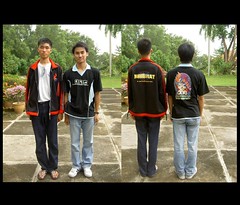
NS
Originally uploaded by mincaye.
Name: Benjamin Ong
Camp: Pinggiran Pelangi, Muadzam Shah, Pahang
Name: Darryl Chong
Camp: KK di bawah Bayu, Tuaran, Sabah
Interesting camp names, no? The 'edge of the rainbow' and 'beneath the mist.' Almost surreal, and yet, the experience at National Service was anything but magical.
One lesson I learnt through much pain and trial this year was that of sacrifice. I will remember the bridge and chorus lyrics of Steven Curtis Chapman's 'For the Sake of the Call':
Not for the sake of a creed or a cause
Not for a dream or a promise
Simply because it is Jesus who calls
And if we believe we'll obey
And we'll answer...
We will abandon it all
For the sake of the call
No other reason at all
But the sake of the call
Wholly devoted to live and to die
For the sake of the call
When we are called to sacrifice unto God, it is often easier said than done, especially in the area of our gifts. God has given me a powerful mind, and that I do not--cannot--deny. But can I, like Paul, truly say I count it loss for the sake of the gospel?
This year, I also learnt an important word: no. Being an avid writer and a rather well-known personality in school, I was approached by various parties seeking my assistance/service in various projects.
Thing is, I actually liked the offers. I found them good opportunities to make full use of my talents and interests. But then to accept all would be to spread myself too thin--it would have been suicidal.
So I passed on many chances to do great things, and discovered a few callings along the way. I am called to study to the best of my abilities; I am called to lead my editorial board in righteousness and good ethic; I am called to serve the brethren of the Christian Union faithfully in my capacity as committee advisor.
Even Shueh-Yi had a similar experience: she quit the Seri Bintang Utara cheerleading squad--for several years the best in the country--because it simply took up too much of her time.
I suppose opportunity always knocks, but we have every right not to open the door, and focus instead on the few things to which we have been called, that we may do them well for God's glory.
In Lewis Wallace's masterpiece, 'Ben-Hur,' the character Gaspar (one of the Magi) says:
"When I think of the purpose I am sent to fulfil, there is in me a joy so inexpressible that I know the will is God's."
The things that give me the greatest joy, I know without a doubt to be the path of the will of God. But that is not to say that all will always be well, for there will be trials to test and strengthen faith.
At NSCF, we read the first few chapters of Daniel for our morning devotions. I found to be particularly stirring, the stand of Shadrach, Meshach and Abednego, when told to worship the king's statue:
"Our God is able to save us from the fire. But know, O king, that even if he doesn't, we will not bow down."
Maybe this is where the cost of sacrifice really shows. We often rest confident that God will provide, so our assurance is something along the lines of, "If God has called me to be a missionary, he will protect and provide."
But what if God does not? What if he doesn't save us from the fire? Will we still follow?
Out of many struggles with questions such as this, has my faith emerged over the last few months. It began with NS, where I learnt to die to self and live in the care of God. Cut off from Christian community, I had to come to terms with the darkest depths of my heart.
And then it continued into Lower Six. I am learning, little by little, to live as a Christ apprentice in the daily routine of what seems to many a path of drudgery--bringing life to an arid desert.
In all of this, I claim a promise of God's that Paul experienced firsthand:
"My grace is sufficient for you; my strength is made perfect in weakness."
The unforced rhythms of grace have been shaping me, breaking me, building me over the last few months, with an intensity I never before knew. And the journey is just beginning; there's more to come!
I would like to share from the chorus of the Clay Crosse song, 'I Surrender All' (which I might have quoted before in a previous entry, but never mind that--it still speaks), written by Regie Hamm and David Moffitt:
I surrender all
My silent hopes and dreams
Though the price to follow
Costs me everything
I surrender all
My human soul desires
If sacrifice requires
That all my kingdoms fall
I surrender all
Reflecting on this, it's so hard to sacrifice all my kingdoms, my silent hopes and dreams. It is to relinquish my self-made sense of purpose, to let my passions fall to the ground--and let God replace them with his.
But that is the Lord's call, for when we pray, "Thy kingdom come," we are not referring to some future rule of God's kingdom, nor are we speaking of some disconnected heavenly realm.
Nay, we are saying, as Willard would put it, "God, let my kingdoms fall, and build Thine in their place." So it is that Matthew adds, "Your will be done on earth as it is in heaven."
At the end of it, I don't think we were ever meant to build all those kingdoms. Maybe that's why so many people are haggard and drawn, chasing after dreams and that pot of gold at the end of the rainbow.
But to live carefree in the care of God, as Peterson puts it, means enjoying the rainbow and the mist while it lasts, giving thanks to the Giver of all things for the halcyon pleasure.
The physical effects are notable; I do feel more youthful lately, and it's great taking each step as it comes, leaving the unanswerables to the Creator, and being content with being his apprentice.
There is only one Master, and he is not me.
NSCF 5: The Unforced Rhythms of Grace
In coordinating the camp group photo (above), I learnt some things about problem-solving. Aunty Siew Khim first suggested the grassy area, one floor down to the right of the sanctuary, where it would be possible to take an elevated shot so none would be too far behind.
But that would mean the photographer could not be in the photo, so I suggested the basketball court or playground, where an elevated shot would be possible and the photographer could run into the picture.
Eventually, when we arrived, Darryl suggested the steps leading down to the playground. As is obvious from the photo, the camera isn't elevated, and everyone can be clearly seen in the photo.
Many times, ideas and suggestions may never be used ultimately. But that doesn't mean they should be discarded; for often, raw ideas fuel us to places where we can arrive at solid, workable solutions.
Aunty Siew Khim's idea of elevation led to the selection of playground/court as photo site, which led to the final arrival at a different angle altogether: one which, in my opinion, gave us one incredible camp picture.
Speaking of playground, it is to me the finest spot in STM for reflection. There is a good balance of people, well-spaced apart--some on the slide, some see-saw, others still monkey bars and swing--and nature.
Even the external noise coming from Seremban (including the famous KTM train that winds through the town several times a day) helps to keep me mindful of the world around us--that we are not completely isolated from human existence.
Sitting on the monkey bars makes me feel somewhat closer to God. Reflecting amidst playthings also brings me back to one of Jesus' strongest words: "Unless you become as a child, you cannot enter the kingdom of heaven."
Towards the end of the three-hour reflection accorded us on Friday, I tried praying in a posture mentioned in Dallas Willard's The Divine Conspiracy--to stand in the shape of the cross, arms outstretched.
It hurt so much--and yet I only did it for a few minutes! I cannot begin to imagine what Jesus himself must have felt, his arms open in that position for six hours... also on a Friday, nearly two thousand years ago.
That position also brought me back to another moment in the not-so-distant past: the d'NA reunion at Audrey's earlier in February. The twelve of us present past midnight, huddled in a circle to pray, arms upon each other's backs.
It was no less painful, but it keeps reminding me that this is how we're to uphold one another--with our arms outstretched in love, as our Master's was. To our left and our right, we hold out open arms, welcoming one another in fellowship and love.
As reflection ended, Caleb picked up a dandelion from the edge of the playground, and blew the white, downy fluff away. To him, it symbolised complete surrended to God, removing all masks and pretensions, leaving the naked stalk which lies under the fluff.
And I wonder; when all that we've built is passed through the fire, when our castles and kingdoms are razed to the ground by the Divine Wind, what will God say of the stalk that remains? Will it be found to stand on the One Foundation? Will he find faith on earth?
On the very first day of camp, during the Arrival session, Nigel read from Matthew 11:28-30, The Message:
Are you tired? Worn out? Burned out on religion? Come to me. Get away with me and you'll recover your life. I'll show you how to take a real rest. Walk with me and work with me--watch how I do it. Learn the unforced rhythms of grace. I won't lay anything heavy or ill-fitting on you. Keep company with me and you'll learn to live freely and lightly.
The phrase, 'unforced rhythms of grace' became overused at camp, much as Michael William's 'complicated' two years ago. But, while 'complicated' was more of a joke, here we really experienced God's unforced rhythms of grace.
Now, we all know that all man-made rhythms are forced: drum beats, handclaps, footsteps, and so on. But the rhythms of the Man-maker, who can predict? As God might have asked Job, can we trace the path of thunder, or find the source of the ocean's roar?
I find the wind a good example of such unforced rhythms. A kite floats in the sky, by no effort of its own, as Bono wrote in 'Kite'; "Who's to say where the wind will take you...?"
To me, the unforced rhythms of grace involves--but is by no means limited to--the complete surrender of oneself to the workings of God's Spirit. It is to stop flying the kite by ourselves, and let it soar in his Wind (Spirit=Breath/Wind in the Hebrew and the Greek).
Throughout camp, there were many obvious--even overwhelming--evidences of the presence of God's Spirit. And even now, as Nigel would agree, many of us are still coming to terms with what we saw/felt/heard at camp. The challenge has just begun, and the unforced rhythms will lead us on, if only we will yield.
One final thought about the camp photo: it is very symbolic.
The tree reminds me of what Uncle Earn Soo said about the mustard seed: do not despise the day of small beginnings. Elijah heard God's voice in a whisper, and great mustard trees start as a seeds that are--in Uncle Earn Soo's words--harder to find than contact lenses.
The sanctuary in the background represents the community of believers as the Temple of the Holy Spirit. As the song goes,
Lord prepare me to be a sanctuary
Pure and holy, tried and true
With thanksgiving, I'll be a living
Sanctuary for you
The steps on which we stood for the photo, can be seen as representative of the journey we are on, in which we are called to follow the Master step by step, further, deeper and higher.
And finally, there is the sky, which in total occupies nearly a third of the photo. What is this kingdom we preach? It is the kingdom of the heavens--a world above ours, whose King is above our kings, whose goodness triumphs over our evil, whose light conquers our darkness.
Go back and tell John [the Baptist] what you have just seen and heard:
The blind see, the lame walk, lepers are cleansed, the deaf hear, the dead are raised, and the wretched of the earth have God's salvation hospitality extended to them.
(Thanks for your patience in reading this long post!)
Tuesday, November 22, 2005
NSCF 4: Koinonia
Centre picture, L-R: Aaron, Lucas, Mark, Anila, Yi Jing, Michele, Shueh-Yi, Caleb, me, and Runa standing behind.
It was during his session on Tuesday (Day 2) that Francis Dunn asked, "Does anyone here know what the Greek word for 'fellowship' is?"
Francis: Let's ask Mark Teen; where is Mark Teen?
Ben (to Mark): Koinonia
Mark (to Francis): Ko-noi-na
Simon (to Ben): You told him!
Francis: Wah, he knows! Don't mess with Mark Teen!
If the believers are to hold all things in common, surely that goes for information as well!
Indeed, I will always remember the word koinonia, as it was the subject of my very first 'sermon' as president of the Christian Union last year.
Since it was a School Christian Fellowship Leaders' Camp, it is only fitting that one of my reflections be on the very subject of fellowship.
Francis used as a model of fellowship, the famous passage at the end of Acts 2, which I here reproduce verbatim from the Message:
They committed themselves to the teaching of the apostles, the life together, the common meal, and the prayers. Everyone around was in awe--all those wonders and signs done through the apostles! And all the believers lived in a wonderful harmony, holding everything in common. They sold whatever they owned and pooled their resources so that each person's need was met.
They followed a daily discipline of worship in the Temple followed by meals at home, every meal a celebration, exuberant and joyful, as they praised God. People in general liked what they saw. Every day their number grew as God added those who were saved.
I believe the Message very much speaks for itself, and I have little to add apart from my thoughts on something Francis said in his session about the 'ministry of wasting time.'
By all earthly standards, the effort we put into helping our friends (and in the case of leaders, our flock) develop as persons, is really a waste of time. The few tangible fruits, if any, rarely seem worth the toil.
But there is a sense of joy in being with one another, and I felt that to be true of our group, Peter, at camp; the committee had become a form of community, with Christ at its centre.
On the second night, during our group reflection, one of the fluorescent lights in the vending machine area (where we met each night) suddenly came on. Most likely, the light was somewhat weak and took a while to start up--but the symbol was too striking to be ignored.
Without being too philosophical or introspective, I find it virtually impossible to say anything about the nature of fellowship and/or community. It simply has to be experienced.
But the passage in Acts 2 indeed offers a concise, accurate and vivid portrait of what true fellowship is; I know because I have experienced it in my school's Christian Union, and in d'NA. And because, in my weakest moments, it is the immortals from whom these unions are forged, who keep me going.
So here's to koinonia past, present and future; indeed they will all be one and last forever at the consummation of all things, when finally the mortal fellowship that was built upon Christ, finds its eternal, glorious fulfilment in Christ.
With whatever little time I have on this earth, I think I will invest more in 'wasting time.' For though this sowing to the kingdom can often be more painful and pleasant, there is a grace that sustains the great adventure. And I am certain the Spirit is leading.
Monday, November 21, 2005
NSCF 3: Glimpses of God
These are various pictures of sunrises at STM, taken over the few days of camp. The purplish one iss pre-sunrise, and the shot at bottom-left is a glimpse of the misty mountain in the distance.
We arrived at the SU office on Saturday in time to witness the approaching storm (miraculously, the storm in Seremban began as soon as the last SU van left STM). Darryl and I spent some time waiting for lightning; we both met with success, mine a photo and his a video.
(Indeed, I like the juxtaposition of the lightning on the left, and the lamp-post on the right; what is the light of man compared to the light of God?)
I compiled this montage with the theme 'God is God' in mind. The song has ministered powerfully to me in the last few days especially. Reading the lyrics against the backdrop of these photos, I believe it is impossible to come to any other conclusion.
God is God
And the pain falls like a curtain
On the things I once called certain
And I have to say the words I fear the most
I just don't know
And the questions without answers
Come and paralyze the dancer
So I stand here on the stage afraid to move
Afraid to fall, oh, but fall I must
On this truth that my life has been formed from the dust
God is God and I am not
I can only see a part of the picture He's painting
God is God and I am man
So I'll never understand it all
For only God is God
And the sky begins to thunder
And I'm filled with awe and wonder
'Til the only burning question that remains
Is who am I
Can I form a single mountain
Take the stars in hand and count them
Can I even take a breath without God giving it to me
He is first and last before all that has been
Beyond all that will pass
So let us worship before the throne
Of the One who is worthy of worship alone
On Friday morning, before our reflection, Runa told us Max Lucado's story, 'You Are Special.' In the Master's eyes, we are special because we are his, not because of our achievements or status.
There are many who will not believe in God for this very reason; for it means that we can no longer take pride in ourselves for our own sake.
Augustine was right about the cry of the human heart: "Our hearts are restless till they find their rest in Thee."
God is God, and we are not.
NSCF 2: Common Ground
When Simon (left) and I stepped into room 2E12 (the very room Soo Tian and I shared for d'NA last year) at STM, we were joined shortly by Ken Jon (centre).
One of us--I cannot remember who--asked, "So who will be sleeping on the floor?" as the rooms there are meant for only two occupants and thus have only two beds.
Ken Jon remarked, "Is that a question or a statement?" to which we all laughed. He promptly marked the floor mattress as his. (I wonder if the fact that Simon and I are two years his senior, had anything to do with it).
Being somewhat ambitious, we opened a window on the first night, and did not rely on electric mosquito mats. In STM, this is usually invites hordes of the resident 'monsters.' However, before sleeping, we said a 'mantra':
Simon: "Mosquitoes, do not enter."
Ben: "Mosquitoes, do not enter."
Ken Jon: "Mosquitoes, do not enter."
All: "Amen."
None entered; if any did, none bit. Most of the other rooms either used mats, or shut their windows, or suffered casualties in the morning.
Simon and I awoke early on Tuesday morning, and made our way to the new pondok in the STM garden for some quiet before the day ahead. We switched on the light and had some fun with 'enlightenment.'
(Note: although the new 'hut' is pretty nice, it would've been somewhat more fitting to build it out of wood rather than concrete).
We moved to the edge of the garden facing east to await the sunrise; there, we were fiercely attacked by the mozzies. However, all was not lost, as I managed to shoot one of them (using my arm as bait) before smacking it.
On the second night, during group reflection, I suggested (much to the horror of my group) that the mosquitoes may really be agents of God to prevent campers from falling asleep during quiet time and/or prayer. Still, I must admit their incessant attacks may prove more a distraction than anything else.
Nevertheless, I will always remember a mosquito-wrought incident which brought more long-term good than evil: Jon's dengue fever at d'NA Stage One in 2003.
Throughout the second half of camp, virtually everyone was united in prayer for him. God used what was meant to harm, to bring us into a closer fellowship with one another.
All said and done, I am very grateful to Abba for answering my prayers for health. In the week before camp, I came into contact with flu-ridden friends in school (i.e. Denise) and was in many another position of vulnerability in that period.
But God kept me healthy during camp, in every sense of the word. Apart from some difficulty getting up on the last day (due to a really late night up on Friday--slept only at about 3:30 a.m.), the rest of camp was a joy-ride physically speaking.
His protection upon us all is indeed magnificent. We shall pick up serpents and be unharmed; we are bitten by Aedes and are spared from dengue. But for God's grace, not only would we not be in the pink of health--indeed, there would be no health to speak of.
NSCF 1: The Alien Commandant
Here begins a series of reflections on the NSCF camp, which was simply amazing beyond words. Do read Nigel's blog (link on sidebar) as well, to get a parallel idea of what it was like.
Anyway, to start with: these were some of the most fun photos taken. From top to bottom:
1. Nigel lying on the sanctuary floor with the evening sun streaming in. Looks like he's flying to infinity and beyond.
2. Nigel standing in the sanctuary, under the morning sun. Looks like he's being beamed up into space by aliens. (Indeed, one morning when Nigel woke up late, Uncle Jason--the SU General Secretary--said rather solemnly, "We have sad news. Nigel has been abducted by aliens.")
3. Nigel wearing Antony's night-vision goggles on the last night. Still need more convincing proof that our camp commandant is not of this earth?
It was really fun having him as the head officer; I think the experience was overwhelming for him too! But there's no turning back, and he's even landed an invitation to speak at SMK Damansara Jaya's CF camp next June.
The first of many such appointments, I am sure. Who knows where the path of a God-follower leads? (Hint: certainly, to infinity and beyond)
Sunday, November 13, 2005
Through flawed leaders
Once he spoke about the nature of God. He believed that when the Bible speaks of God being slow to anger, it means that God's anger accumulates, that is, once God's anger reaches its limit, it bursts out and nothing can stand in its way. He also asked if God is passionate. His answer was that God could not be passionate, or else he would be blinded by emotions.
In retrospect, I find his perspectives somewhat flawed; indeed, I believe God loves passionately, but with a kind of passion that is above that of mortals. I also do not believe that he who is love, can harbour anger; I do not believe the one who said 'forgive seventy times seven times' can accumulate his rage. Yes, God does get angry (just ask temple traders), but it is not the sort of anger that is allowed to brew within.
But I have not seen Marcus in some time, and perhaps he has grown much. For it occurred to me just now, that he was only a 17-year-old fifth former when he conducted those classes. Looking back, I realise just how foolish, presumptuous and overconfident I was back in the fourth and fifth forms.
Leaders and teachers will always be flawed, for we are all growing together, making mistakes together. I guess this is where humour comes in; without the ability to take everything with a pinch of salt (sugar will cause diabetes, see?) and to laugh along the way, we will become monuments of stone all too set in our ways.
It is like what Oswald Chambers said, "Huge waves provide a great thrill for the surfer who has learned to ride them," (or something to that effect). Without the capacity for laughter and fun along the journey, we will be afraid of the waves--afraid to take the plunge into the world of God.
Anyway, I owe a lot to Marcus. Every CU leader from the day I stepped into school until now, has left an indelible mark in my life, influencing me in various ways, shaping me into the person I am now. Marcus introduced me to Max Lucado, namely his book 'In the Grip of Grace,' which I consider, until today, one of the finest works I've ever read on the subject. And, as I have mentioned before, I learnt much of my writing from Max.
As I prepare and go for the NSCF Leaders' Camp tomorrow, I am reminded of the path my CU has taken, from Alvin through Marcus, Kenneth, Jonathan, me, Jeremiah and now Wilson. We are all imperfect people, struggling apprentices to a Divine Master. But somehow God has used every leader who came before me, and who's to say he won't continue doing that?
If it means anything at all, the journey my CU has taken only testifies to a God who is in the people-shaping business, moulding immortals out of flesh and bone. And that is precisely the path that lies before us: investing in the lives of people and not programmes, souls and not structures--developing those who count themselves among our 'flock.'
Thanks for the reminder, David ;-)
Saturday, November 12, 2005
Amidst the Dandelions
The dandelions were in full bloom (they have now been mercilessly mowed down) and the sun was shining brightly overhead (it still shines).
Li-Shia stayed back to wait for Ching Yeng, who was painting the Science and Maths Society's room with Chun Hong, Raveena and (I think) Kah Loong, and I was waiting for Mum.
It was a rather nice country-esque feeling, albeit on a much smaller scale, given the limited hilly land facing the Form Six block.
If only we were in vast, endless fields of dandelions and lavender (and in Li-Shia's case, with a chocolate river and soya bean fountain nearby, not to mention Sony T7s in abundance)!
...Bollywood is really going to sue me for this ;-)
That all my kingdoms fall...
Back then I was a much simpler person, engaged only in studies, the school Christian Union and some forays into the literary world. But NSCF opened up a whole new world for me, most of all where people were concerned. All of a sudden, I got to know people from across the country, including a music fanatic from Alor Setar and a lame joker from Singapore.
Above all, it opened the door into d'NA, via Yoshua. Before I knew it, I was absorbed into a community like none other, and I was constantly being challenged by spiritual dimensions then alien to me.
Two years down the road, I have been transformed, in no small measure by the people I met through these camps, into a blogger, photographer, amateur theologian and philosopher.
But the learning process has been a difficult one. I remember going into d'NA Stage One, very confident of my exceptional thinking ability (or so I thought), and then later concluding that critical thinking isn't everything. Now I have come to realise that none of what we have really matters; God simply wants us to give ourselves wholly to him--all that we are and ever hope to be--for his glory and not ours.
I was reading C.S. Lewis' essays 'Membership' and 'A Slip of the Tongue.' The former was concerned with our membership in the mystical body of Christ, while the latter (also his very last) discussed the necessity of seeking the things eternal. But both had in common the thread of yielding to God, abandoning ourselves completely to him, that we may be made truly ourselves.
The path of learning, of being humbled and broken by God, has taught me never to be overconfident of my abilities, but to surrender them to him, that in him alone they may find their true meaning and purpose.
And so, although this year I attend NSCF as a senior, with much experience and knowledge under my belt, I remain fully aware that I have much to learn from God and from my fellow campers and officers. In this race, I am constantly challenged by those who are lesser than me, especially in their simplicity and youthful zeal.
The words of Clay Crosse's song 'I Surrender All' (written by Regie Hamm and David Moffitt) keep reminding my of what it means to be a God-follower, to be an apprentice of Christ (incidentally this year's NSCF theme). I quote the song in part:
If the source of my ambition
Is the treasure I obtain
If I measure my successes
On a scale of earthly gain
If the focus of my vision
Is the status I attain
My accomplishments are worthless
And my efforts are in vain
So I lay aside these trophies
To pursue a higher crown
And should you choose somehow
To use the life I willingly lay down
I surrender all the triumph
For it's only by Your grace
I relinquish all the glory
I surrender all the praise
I surrender all
My silent hopes and dreams
Though the price to follow
Costs me everything
I surrender all
My human soul desires
If sacrifice requires
That all my kingdoms fall
I surrender all
Friday, November 11, 2005
The Trouble With Love Is
The Trouble With Love Is
Love can be a many splendoured thing,
Can't deny the joy it brings:
A dozen roses, diamond rings,
Dreams for sale and fairy tales.
It'll make you hear a symphony,
And you just want the world to see,
But, like a drug that makes you blind,
It'll fool you ev'ry time.
Chorus:
The trouble with love is
It can tear you up inside,
Make your heart believe a lie.
It's stronger than your pride.
The trouble with love is
It doesn't care how fast you fall,
And you can't refuse the call.
See, you've got no say at all.
Now I was once a fool, it's true,
I played the game by all the rules;
But now my world's a deeper blue,
I'm sadder but I'm wiser too.
I swore I'd never love again,
I swore my heart would never mend,
Said love wasn't worth the pain,
But then I hear it call my name.
Chorus
Ev'ry time I turn around,
I think I've got it all figured out.
My heart keeps calling, and I keep on falling
Over and over again.
This sad story always ends the same:
Me standing in the pouring rain.
It seems, no matter what I do,
It tears my heart in two.
Chorus
Canine theology
And so it is with us, who were created to bring joy to our Master, God--we are the apple of his eye. When he created the universe and all in it, he took a step back, gazed upon it all, and proclaimed it 'very good.'
The problem with this is that people tend to think of bringing joy in terms of a court jester or a spoilt toy dog--as if we mainly exist for God to laugh at our expense. But that is our failure, not his.
My dog shares a very special bond with my family; indeed, the same is true of all other dogs who are loved by their owners. And if we can mean to world to our dogs, how much more should God be to us!
We in our benevolence towards our canine friends cannot begin to compare with God's goodness to us all. Yet it is our comparison with dogs that mocks us all the more: they are more faithful to us than we usually are to God.
At the end of the day, the dog greets the master with such explosive and contagious enthusiasm; yet God is a word frequently missing from the vocabulary of many a person, and often exists, if at all, as a swear word.
Maybe that's why dogs are considered to be man's best friend--they remind us so much of ourselves, and continue to encourage us in our adventure with the Great Father who is Lord of the canines and the humans and everything else.
What was God thinking?
Cornell won the Nobel Prize for Physics in 2001, and the article he wrote, What Was God Thinking? Science Can't Tell, was adapted from a speech that he gave for his induction into the American Academy of Arts and Sciences. It's really worth reading, especially if you're interested in religion and/or science. Click here.
The following is an excerpt from the article:
Let me pose you a question, not about God but about the heavens: "Why is the sky blue?" I offer two answers: 1) The sky is blue because of the wavelength dependence of Rayleigh scattering; 2) The sky is blue because blue is the colour God wants it to be.
My scientific research has been in areas connected to optical phenomena, and I can tell you a lot about the Rayleigh-scattering answer. Neither I nor any other scientist, however, has anything scientific to say about answer No. 2, the God answer. Not to say that the God answer is unscientific, just that the methods of science don't speak to that answer.
...As a theological idea, intelligent design is exciting. Listen: If nature is the way it is because God wants it to be that way, then, by looking at nature, one can learn what it is that God wants! The microscope and the telescope are no longer merely scientific instruments; they are windows into the mind of God.
...My call to action for scientists is, Work to ensure that the intelligent-design hypothesis is taught where it can contribute to the vitality of a field (as it could perhaps in a theology class) and not taught in science class, where it would suck the excitement out of one of humankind's great ongoing adventures.
...[D]on't say science disproves intelligent design. Stick with the plainest truth: science says nothing about intelligent design, and intelligent design brings nothing to science, and should be taught in theology, not science classes.
I believe Dr Cornell's perspective is a wise one. All this while, the 'God--no God' dilemma has been fought out mostly in the average school classroom. After all, how can two seemingly contradictory theories be taught simultaneously, without the bias falling upon one more than the other?
But here he takes as his basic assumption an oft-overlooked truth about science: it simply does not speak to the God answer. A microscope cannot detect sound waves; does that mean that sound does not exist, or that the microscope is faulty? No, it just wasn't designed for that purpose. Likewise, science was not designed to interpret God; it was designed to study the world. God cannot be 'detected' by science alone.
I say his suggestion is wise, because in any given class, there are only three kinds of student: the wise, the simple and the indifferent. It is clear that nothing matters to the indifferent except the lunch bell. So that leaves the wise and the simple.
The risk of teaching intelligent design in general classrooms is that the simple may fall into two equally erroneous pits; either to assume that everything happens by the 'will of God' and so to consider scientific research pointless, or else to find hard science more 'readily comprehensible' and so make no room for the invisible God.
It is fairly safe to say that the wise are not likely to be affected by any decision made within and for the classroom, for their education will naturally encompass a far greater breadth, in multiple disciplines and in various places. They are not restrained by systemic constraints.
And so, perhaps it is only best to teach what is at most a system of learning about the world, in the classroom. And then, the more discerning will always realise that science does not answer the God question; they will then seek the Creator wherever he is to be found, but they will not assume that he can be 'done in' by mere mortal methods. Nothing can change the myopia of the less discerning, and so it does not matter.
Perhaps it is for the more holistic good, that natural science and supernatural design are kept apart within the confines of formal education, for then they will not seem like enemies. Discovered in separate contexts, they may in fact become complementary areas of exploration for scientists and laypersons alike. Thus Cornell ends his article:
My argument here is offered in the spirit of trying to preserve science from its foes--but also from its friends.
Wednesday, November 09, 2005
Reflection
Whatever the case, there was so much laughter, we almost needed to contact MOX (Malaysian Oxygen) to supply us with oxygen gas tanks, heheh.
The lighting outside the lifts on the 10th floor was particularly encouraging, so we attempted this mirror shot. Came out rather well, I must say!
Glassy Sunset
The droplets left by the rain were still on the car's windows, and the sky was of a particularly mythical orange hue -- I like the idea of cascading colours against a dark backdrop, and orange and black certainly go well!
You can even spot a tiny air balloon in the distance ;-)
Saturday, November 05, 2005
d'NA: A Laughing Community
Someone has said that the only two organisations that are really changing people are twelve-step groups and the church. The common denominator behind the success of both is community. Change happens when we allow others into our lives.
It's hard to build deep, trustworthy friendships in today's shallow social climate... But let's just get over it. You and I desperately need some people in our lives who will attempt to love us unconditionally, who know us well enough to know when we are hiding something, who can get away with confronting us, and who can "spur [us] on toward love and good deeds" (Heb. 10:24).
Very much sounds like d'NA, although I dare say the d'NA is more like a twelve-step group than a church!
And here's some from Dallas Willard's 'The Divine Conspiracy':
There will be lots of laughter in heaven, you can be sure, as well as joy, for our finitude will always remain. Just imagine an eternity in which no one laughs!
And we should note that one of the things that disappear when we are grinding away at others with our condemnations, blamings, and "pearls" is, precisely, laughter. We become insufferably grim. But genuine shared laughter is one of the surest ways for human beings to come together and break the stalemates of life. It is essential to genuine community.
No wonder, then, that laughter is so good for our health. It is even a symbol of redemption, for there is no greater incongruity in all creation than redemption. When deliverance comes, "we are like those who dream: our mouth filled with laughter, our tongue with shouts of joy" (Ps. 126:1-2).
Here's to countless days of laughter to come, d'NAers!
Donne revisited
No man is an island entire of itself; every man
is a piece of the continent, a part of the main;
if a clod be washed away by the sea, Europe
is the less, as well as if a promontory were, as
well as any manner of thy friends or of thine
own were; any man's death diminishes me,
because I am involved in mankind.
And therefore never send to know for whom
the bell tolls; it tolls for thee.
And the Olde English Version:
No man is an Iland, intire of itselfe; every man
is a peece of the Continent, a part of the maine;
if a Clod bee washed away by the Sea, Europe
is the lesse, as well as if a Promontorie were, as
well as if a Manor of thy friends or of thine
owne were; any mans death diminishes me,
because I am involved in Mankinde;
And therefore never send to know for whom
the bell tolls; It tolls for thee.
In our conversation, we also turned to the topic of gay marriage. It dawned upon me that, while people tend to share values, sometimes it seems like they preach opposites simply because of misconceptions and preconceptions.
It was somewhat providential that I read Dallas Willard's thoughts on non-condemnation in his 'Divine Conspiracy' earlier that afternoon, in which he points out that when Jesus spoke of 'judging not' because of the plank in our eye, that plank is not some inherent weakness or blind spot, but in fact the act of condemnation itself.
Lian Jen is for gay marriage; I am not. It seems so difficult, these days, to uphold absolute right on wrong on the one hand, and yet maintain a spirit of non-condemnation. And many who mean well, end up bringing more hurt than help. Again, it is like the man who tried to safe fish from drowning by pulling them out onto land.
But Jesus did it. No one was and is or ever will be more morally upright and unflinching than he, and yet no one was more widely accepted as a friend by virtually every level of society. Would that we, his followers, could emulate that.
Honestly, I don't know what Jesus would say about these moral dilemmas plaguing today's society, let alone how he would say it. But I do believe his spirit of love would be more powerful and pervasive than anything we could throw at it.
Thursday, November 03, 2005
Nights of Fire
After leaving Toch's, having spent nearly three hourse there, I reached Raveena's at about 4 o'clock.
This was a comparatively small-scale event, but far noisier! I had my first go at fireworks (yes, in my entire life), and it was a really fun time of meaningful conversation and lessons learnt at the dining table.
For one: never pop ghee cookies whole into your mouths. (Fiona, if you read this, don't get stomach cramps!)
It is my pleasure to introduce our lead pyrotechnician, Kavin (Raveena's 12-year-old brother) in the picture above (and the silhouette below).
And in the central picture, from left to right, are Sharveena (Raveena's 16-year-old sister), Fiona, Raveena and yours truly.
(The background photo came from a Yahoo! picture search).
Playing with fireworks reminded me of the words written on the back of my General Chemistry textbook, on whose front cover is a picture of fireworks:
"The pyrotechnician combines his knowledge of chemistry with his love for art, to paint the sky with colour."
